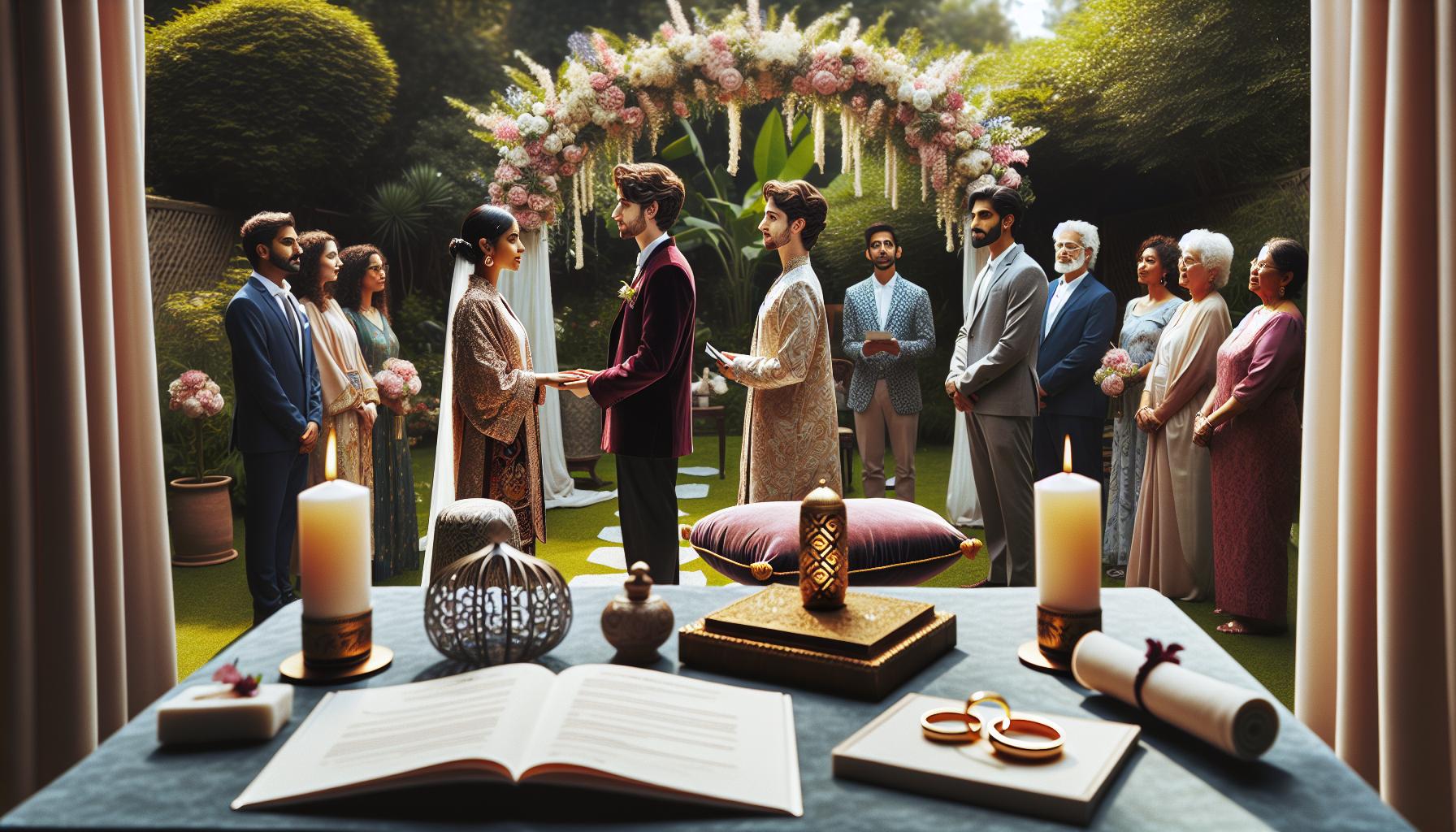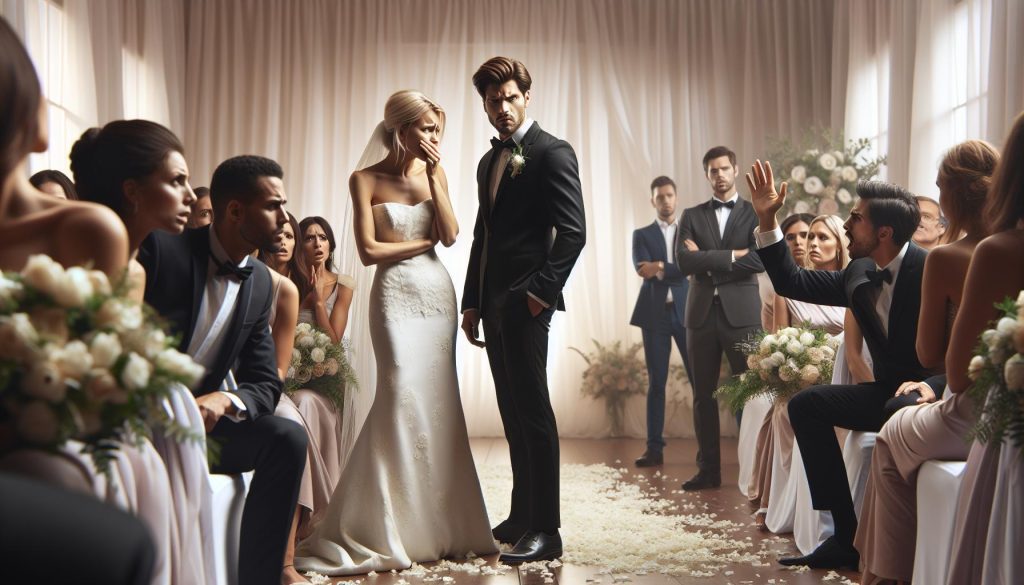Imagine standing at the altar, ready to say “I do,” when suddenly, someone raises their voice to object. This dramatic moment might seem more like a scene from a movie than a reality of wedding planning. However, objections can and do happen, and understanding the real consequences can help you navigate this unexpected scenario with grace. Not only can an objection stir emotional turmoil, but it can also lead to legal or relational complexities that could impact your special day and future together. Join us as we delve into what happens when someone objects at a wedding, exploring the potential fallout, traditions surrounding objections, and strategies to address such situations while keeping your love story at the forefront. This knowledge will empower you to celebrate your union with confidence, ensuring that unforeseen challenges don’t overshadow your joyous occasion.
What Legal Rights Do Objects Hold at Weddings?

In the context of weddings, the notion of objection often conjures images of dramatic confrontations, but legal implications play a significant role underneath the surface. Generally, the right to object during a wedding ceremony is rooted in social and relational dynamics rather than legal statutes. When someone steps forward to voice an objection, it is usually done based on personal beliefs, unaddressed feelings, or genuine concerns about the union.
From a legal standpoint, the person objecting holds no formal rights to disrupt the ceremony. The officiant is tasked with the responsibility of ensuring that the vows are exchanged without hindrance, so any objection does not legally bind them to cease the proceedings. That said, it’s important to recognize that objections can lead to considerable emotional fallout for all parties involved, potentially influencing family and friendship ties.
If a wedding officiant chooses to acknowledge an objection, they may engage the person briefly to understand the grounds for their protest. However, unless backed by legal reason-such as the matter of one party being already legally wed or underage-the objection does not have lasting legal weight. In essence, while individuals may feel compelled to voice their objections, their influence is confined largely to the emotional landscape of the wedding rather than imposing any legal constraints on the nuptials themselves.
Ultimately, navigating the delicate balance between the right to object and the sanctity of the wedding vows can unify or divide relationships, marking a pivotal moment in the lives of those involved. Being equipped with this understanding can help couples anticipate and manage what could be a challenging aspect of their big day.
Common Reasons for Wedding Objections

Emotions run high on a wedding day, a celebration of love and commitment; however, it is not uncommon for objections to arise, often overshadowing the joyous occasion. Understanding the typical reasons behind these objections is crucial for couples planning their big day. While these moments can feel dramatic, they are often rooted in genuine feelings and concerns.
A common reason for objections is unresolved feelings from a previous romantic relationship. This can include ex-partners expressing lingering attachments or family members who may oppose the union due to the history they share with one of the individuals. Sometimes, objections reflect long-held beliefs about compatibility, particularly when family members have specific expectations regarding cultural, religious, or social factors. These situations may arise from a perceived lack of shared values or lifestyles, making relatives or friends uneasy about the marriage’s future.
Additionally, concerns about the couple’s readiness for marriage can lead to objections. Friends and family members might worry about the couple’s financial stability, emotional maturity, or commitment to the union. In some cases, revealing personal information, such as one partner’s past legal issues, can also spark objections. Such heartfelt interjections often stem from concern for a loved one’s happiness and well-being, highlighting the fine line between supportive advice and the desire to halt a ceremony.
Ultimately, while objections can be unexpected and emotional, they can also open up avenues for important conversations. Understanding why someone might object is vital in navigating the complexities of wedding planning and enhancing the relationship’s overall resilience. Recognizing these motivations cultivates an atmosphere of compassion and understanding, allowing couples to address potential issues and solidify their commitment to each other as they move forward.
The Emotional Impact of Wedding Objections
On the day when two souls pledge their love for eternity, the atmosphere is typically charged with joy and excitement. However, when an objection arises, it can create a ripple effect of emotional turmoil that may overshadow the day’s intended bliss. The emotional impact of such moments is profound, not only for the couple but also for their families and friends who witness the occurrence. Factors such as surprise, embarrassment, and disappointment can easily unsettle a once-joyous occasion, leading to feelings of confusion and distress that linger long after the ceremony.
The person delivering the objection is often torn between their genuine concern and the fear of ruining the celebration. This act exposes their vulnerability and can create an unexpected division among guests, pitting supporters of the couple against those who share the objector’s viewpoint. Friends and relatives may find themselves caught in an emotional tug-of-war, where loyalties are tested, and sentiments collide. In that moment, the joyous celebration is transformed into a scene of unmet expectations and unvoiced fears, making it essential for all involved to navigate their emotions thoughtfully.
For the couple, the emotional fallout can be equally challenging. Each objection can leave unanswered questions and seeds of doubt about the relationship’s strength and future viability. Couples may reflect on their connections not only with each other but also with those who expressed concerns. The emotional weight of an objection can lead to a wide range of feelings, from sadness and anger to a possible surge in conviction about what the partnership truly means. Couples may feel compelled to engage in deeper conversations about their relationship after the event, which, while daunting, can ultimately strengthen their bond as they confront these complex emotions together.
A wedding objection can serve as a pivotal moment, sandy yet memorable, compelling couples and families to engage more earnestly in relationships. Rather than a definitive end, it can instead become an opportunity for growth and understanding, allowing everyone involved to address underlying issues openly. When couples embrace these challenges with resilience and compassion, they pave the way for a more profound connection not only with one another but with their loved ones, leading to a wedding that, despite its rocky moments, will remain a story of love and commitment worthy of retelling.
How to Handle an Objection Gracefully

Navigating an objection during a wedding ceremony can be a delicate endeavor, but handling it with grace and composure can help restore joy to an otherwise tumultuous situation. It is essential for couples, officiants, and guests to maintain a calm demeanor when faced with unexpected complications. A thoughtful response can not only defuse the immediate tension but also reaffirm the couple’s commitment to each other, no matter the challenges faced.
Maintain a Calm Environment
When an objection arises, the first step is for the couple and officiant to remain calm. The officiant should gently acknowledge the objector, asking them to state their concerns in a respectful manner. This approach allows for an open dialogue and mitigates potential disruptions. It’s vital to emphasize a spirit of respect and understanding-weddings are significant transitions in life, and emotions can run high for all involved.
Empathy is Key
Understanding the motivations behind an objection can help the couple respond appropriately. Often, objections stem from love and concern, even if they are miscommunicated. The objector should be treated with empathy, and their feelings should be validated. Couples can take a moment to express appreciation for the concern, allowing for a brief pause in the ceremony to address the objector’s worries without escalating tension. This simple gesture can transform a charged moment into an opportunity for dialogue.
Set Clear Boundaries
While addressing an objection, it is equally important to set boundaries. If an objection is based on misconceptions, the couple should clarify their positions firmly but kindly. After acknowledging the concerns, couples might politely remind the objector of the nature of the occasion-the celebration of love and unity. If the objection cannot be resolved immediately, it may be beneficial for the officiant to propose a private conversation after the ceremony. This maintains the focus on the celebration while allowing for the necessary discussion to take place after the vows are exchanged.
By fostering an atmosphere of understanding and respect, couples can effectively manage a wedding objection and keep the focus on the love they are celebrating. Following an empathetic framework during such moments not only eases potential distress but also acknowledges the existing bonds between the couple and their loved ones, highlighting that the journey to matrimony encompasses all relationships involved. This approach is not just about overcoming the momentary hurdle but enhancing emotional connections as they affirm their commitment to one another.
Immediate Consequences of an Objection
The moment of an objection during a wedding can stun both the couple and the guests, temporarily halting the celebration of love and unity. This unforeseen interruption not only disrupts the flow of the ceremony but also brings about immediate emotional and social consequences that can reverberate long after the vows are exchanged. Understanding these impacts can help couples navigate the aftermath with grace and resilience.
One of the most immediate consequences is the emotional shock experienced by the couple and their families. Guests may feel a mix of confusion, sympathy, or even discomfort, while the couple must process this unexpected challenge to their commitment. The objector may have meant well, but regardless of their intentions, the heartfelt moment can be transformed into a scene of uncertainty. This emotional turbulence can lead to a collective tense atmosphere, requiring careful management to prevent lasting fallout.
In the wake of an objection, it’s common for family dynamics to shift dramatically. Voices may be raised, relationships tested, and loyalties questioned as onlookers try to grasp the motivations behind the objection. A previously joyous occasion can quickly become a source of conflict, especially if the objector is a close family member or friend. The couple might find themselves mediating discussions and emotions immediately following the incident, necessitating strong communication and a united front to reaffirm their commitment in the face of adversity.
Moreover, the logistics of the ceremony may be affected. Depending on how the objection is handled, the officiant might decide to pause for clarification, leading to awkward silences or side conversations among guests. This interruption can overshadow the original purpose of the gathering, shifting the focus from celebration to resolution. Couples may need to address the objection publicly or seek private discussions afterward to regain control of the narrative, reminding everyone of the love they are celebrating.
In the context of planning, couples are encouraged to consider the implications of an objection and adopt preventative strategies. Open communication with family and friends about their relationships can help mitigate surprise objections. Ensuring that all significant parties are on board with the nuptial plans creates a sense of unity that leaves less room for doubt on the big day. Embracing a proactive approach can empower couples to celebrate their love in harmony, allowing the wedding to unfold as a beautiful expression of their commitment.
Long-Term Effects on Relationships and Families
The aftermath of a wedding objection can ripple through relationships and families, casting shadows on what was meant to be a day of joy and celebration. Family dynamics may shift dramatically as previously solid bonds are tested. It’s not uncommon for the couple’s immediate family members to take sides, leading to rifts that can linger long after the ceremony. The emotional weight of the objection must be navigated carefully, often requiring the couple to act as mediators, reassuring their loved ones while simultaneously affirming their commitment to each other.
When an objection occurs, the original connection that brought families together can feel strained. For instance, a close friend or family member who objects due to personal grievances may create an environment of discomfort and distrust among guests. This tension can lead to ongoing friction in family gatherings, with undercurrents of unresolved feelings affecting future interactions. It may take time for trust to be rebuilt; couples might need to facilitate open conversations to mend these frayed relationships.
Additionally, the long-term impact extends beyond immediate family relationships. Friendships can transform, with initial bonds shifting as social circles react to the objection. The objector’s rationale may influence how others perceive the couple’s union, creating an atmosphere of skepticism or disapproval that takes time to diminish. For some couples, this may even lead to re-evaluating friendships, prioritizing those who will support their marriage confidently.
To navigate these complexities with grace, couples should consider proactive measures. Openly discussing relationship dynamics with both families before the wedding can foster greater understanding and potentially mitigate objections. Mutual respect and communication are key; reminding everyone of the love and commitment at the center of the celebration can help unify families moving forward. In essence, while the objection may serve as a catalyst for change, it can also provide an unexpected opportunity for growth, honest dialogue, and healing within family and social structures.
Cultural Perspectives on Wedding Objections
Throughout various cultures, the act of objection during a wedding ceremony holds a unique significance that extends beyond the moment itself. Whether spurred by familial bonds, traditional expectations, or personal convictions, objections can reflect deep-rooted heritage and societal nuances. For cultures deeply ingrained in family honor and societal approval, an objection can be a pivotal moment that not only disrupts the ceremony but also challenges the social fabric of their community.
In many cultures, traditional mores dictate that family and relatives play an essential role in marital unions. For instance, in certain Eastern customs, especially in India, weddings are seen not just as a union between two individuals but as a convergence of families. Here, an objection can be seen as a serious confrontation that may require mediation within the family context, emphasizing the collective over the individual. The ramifications of such objections can ripple through communal relationships, leading to family feuds or, conversely, opportunities for reconciliation and dialogue.
Conversely, in Western cultures, an objection might carry different connotations. It can symbolize personal agency and the right to voice concerns that might affect one’s loved ones. The phrase “speak now or forever hold your peace” highlights a cultural expectation that everyone present has a say in the union’s legitimacy. In this context, an objection might not only challenge the couple but may also invite reflection on relational dynamics, encouraging open communication within families.
Cultural beliefs about love and relationships can influence the emotional landscape surrounding objections. For example, in some Latino cultures, the collective identity of the family and community is paramount. An objection from a family member may voice a concern about compatibility or the suitability of the union, prompting open discussions about expectations and values, which can reinforce or redefine familial bonds.
To navigate these intricate cultural landscapes, couples can embrace the diversity of perspectives surrounding objections. Open dialogues with family before the wedding, rooted in understanding and respect, can profoundly affect how potential objections are received, should they arise. By fostering an environment where concerns are addressed openly, couples can minimize misunderstandings and create a supportive framework that honors both their love and their families’ traditions.
Preventative Measures: Avoiding Objections Before the Ceremony
In the excitement and joy of wedding planning, addressing the potential for objections might feel like a daunting and negative step to consider. However, proactively engaging with loved ones about the upcoming union can significantly enhance the celebration and create a more harmonious environment. Communicating openly with family and friends before the big day can pave the way for a smoother ceremony and ensure that everyone feels included and respected.
To help foster understanding and alleviate concerns, couples can take the following proactive steps:
Open Communication Channels
Establishing transparent dialogue is key. Couples should initiate discussions with close family members and friends about the relationship and wedding plans. This open communication can address any reservations or concerns before they escalate into objections. Consider hosting casual gatherings or intimate dinners where these topics can be broached in a relaxed setting, allowing people to share their feelings without pressure.
Involving Family in the Process
Bringing family into the wedding planning process can create a sense of ownership and belonging. Invite parents or siblings to help with preparations, such as selecting venues, food, or decorations. When family members feel valued and involved, they are less likely to harbor opposing views. This can transform the planning into a collaborative journey, reinforcing familial bonds and understanding.
Understanding Cultural Expectations
If your families come from diverse backgrounds, exploring and acknowledging cultural traditions is essential. This shows respect for the values that may influence their perspectives on marriage. Consider incorporating meaningful customs into the ceremony that reflect both families’ backgrounds-this could serve as a bridge to unite different cultures and dispel potential objections arising from uncertainty or unfamiliarity.
Pre-Wedding Counseling
Attending pre-marital counseling can be an excellent way for couples to align their expectations and commitments. This structured environment offers a space to discuss potential areas of conflict, including family dynamics and values. Furthermore, inviting family members to participate in select sessions can foster greater understanding and dispel reservations ahead of the wedding day.
By planting the seeds of openness and respect before the ceremony, couples can cultivate a supportive atmosphere that celebrates their love and mitigates the risks of objections. Creating an inclusive environment where everyone feels heard can transform obstacles into opportunities for connection, allowing all parties involved to bask in the joy of the occasion. Embrace these preventative measures to ensure your wedding day is filled with love, laughter, and cherished memories.
What to Do If You Are the One Objecting
When faced with the momentous decision to voice an objection at a wedding, it’s crucial to approach the situation with both sensitivity and clarity. The act of objecting is often seen as dramatic, but if you truly believe that the marriage shouldn’t proceed, preparing yourself psychologically and socially can help ease the emotional weight of this decision.
First and foremost, assess your reasons for objecting. Whether it’s concerns about the couple’s compatibility, unresolved issues from the past, or an instinctive gut feeling, it’s vital to ensure that your objection is grounded in genuine concern rather than fleeting emotions. Should you choose to intervene, try to maintain a respectful demeanor. Understand that public objections can put immense pressure on everyone involved, including the couple and the guests.
Communicate Privately Before Taking Action
Before stepping into the spotlight, consider reaching out to the couple privately prior to the ceremony. This direct conversation might provide clarity and an opportunity to discuss your concerns. If the couple is receptive, it could lead to a constructive dialogue that prevents awkwardness in front of their loved ones. For instance, scheduling a casual meetup or sending them a heartfelt note can express your feelings while also giving them the space to reflect on the matter.
Choosing the Right Moment
If, after all, you decide that voicing your objection is necessary, choose your moment wisely. Timing can be crucial-wait for a pause between vows or during a designated time for comments to ensure that your words resonate genuinely rather than abruptly interrupting the proceedings. When you speak, keep your points concise and poignant to help others understand your perspective without overwhelming them with excessive emotion.
The aftermath of an objection can be complex, both for the couple and your own relationship with them. Be prepared for a range of responses, from gratitude for voicing a concern, to anger or disbelief. Remaining open to discussion post-ceremony is vital, as it can provide the space needed for healing and understanding. Respect their decisions moving forward, and remember that your intentions, regardless of the outcome, should be rooted in love and concern for their well-being. This thoughtful approach can help transform an uncomfortable situation into an opportunity for growth and deeper understanding among all parties involved.
Legal Implications: Can You Be Removed from a Wedding?
When a wedding is set to unfold and emotions run high, the backdrop can quickly shift if an objection is raised. While it may seem like a moment of drama, the reality of the situation involves several legal and social considerations, particularly regarding whether a person can be removed from the ceremony after they voice their objection. Understanding these implications can provide peace of mind to couples and guests alike.
Typically, weddings are private events, and the couple or officiant retains the authority to manage the ceremony. If an individual makes an objection, the officiant may ask them to leave to ensure the event proceeds smoothly and respectfully. This removal isn’t solely based on the objection itself, but also on the behavior and demeanor displayed during the objection. If the individual is disruptive or aggressive, they may be escorted out by security or venue staff, especially if the wedding takes place in a public space or a venue with stringent rules.
Legally, there are few formal repercussions for objecting at a wedding, as such actions generally don’t fall under criminal law unless they escalate into harassment or disorderly conduct. However, it’s crucial for the person objecting to consider the potential social fallout; being removed from a wedding can strain relationships and affect their standing within the family or community. In some cases, a calm and constructive objection may foster discussion, while a heated outburst could lead to long-lasting divisions among friends and family members.
Furthermore, after an objection, it’s essential to gauge the emotional landscape of everyone involved. Though a removal may seem like a resolute end to the shared moment, the true journey often lies in what follows. Open communication and a willingness to address the root causes of the objection can help mitigate any aftershocks from the event, allowing for healing and a return to celebratory spirit in the days to come. Ultimately, understanding the dynamics at play can empower all parties and help create a more supportive atmosphere, regardless of the outcome.
Rescheduling or Canceling a Wedding After an Objection
When the dream of a perfect wedding takes an unexpected turn due to an objection, couples may find themselves facing the daunting decision of whether to reschedule or cancel their special day. The mere presence of a conflict can throw a wrench into celebration plans, thereby creating a cascade of thoughts and emotions regarding the future of the relationship. Rather than succumbing to despair, it’s essential for the couple to closely examine the dynamics at play and to navigate the path ahead with clarity and understanding.
A thoughtful approach to this situation begins with open communication. After an objection, the couple should sit down together to discuss their feelings and perspectives on the matter. This is a crucial moment that can either strengthen their bond or lead to further disagreements. Taking the time to understand each other’s stance is indispensable. In some cases, the objection may reveal underlying concerns that were previously unaddressed, enabling the couple to work through issues that could positively affect their relationship moving forward.
Additionally, if the objection stemmed from significant concerns about the suitability of the union, it might prompt the couple to reconsider their plans. Here are a few actionable steps to consider when contemplating rescheduling or canceling the wedding:
- Assess the Objection: Understand the reasons behind the objection. Is it a matter of personal concerns about one partner, family involvement, or financial stress? Identifying the root cause is vital for decision-making.
- Consult Trusted Advisors: Seek advice from family members, friends, or counselors who can provide insights without taking sides. Their outside perspective may help clarify thoughts.
- Evaluate Venue and Vendor Policies: Check the contracts with venues and vendors regarding cancellation or rescheduling. Many have specific policies which may impact your decision financially.
- Consider Timing: If you decide to reschedule, select a date that feels right for both partners, allowing sufficient time to address concerns and rejuvenate enthusiasm for the celebration.
While it’s not easy to navigate such complex emotional terrain, moving forward with intention and respect towards each other can lead to a strengthened partnership. Ultimately, any decision should be mutually agreed upon, ensuring that both individuals feel heard and valued. The couple’s commitment to resolving the situation can transform this challenging moment into an opportunity for growth and understanding, allowing for a wedding filled with genuine love and joy.
Navigating the Aftermath: Support for Affected Parties
When a wedding objection occurs, it can create a ripple effect that impacts not just the couple but also their families and friends. Understanding this emotional landscape is vital for everyone involved. It’s essential to acknowledge the feelings of those who are affected-be it the couple, the objector, or attendees-creating a supportive environment that fosters healing and reflection.
Effective communication is paramount in the aftermath of an objection. Encourage open dialogues where feelings can be expressed without fear of judgment. Partners should take time to discuss their reactions to the objection and what it revealed about their relationship. This can be an opportunity for growth, allowing each partner to voice their concerns and aspirations for the future. It’s also crucial that the objector feels respected and understood, regardless of the outcome.
Support from family and friends can play a pivotal role in navigating these challenging waters. Friends and family should approach the situation with compassion, offering a listening ear and emotional reassurance. For the couple, leaning on trusted confidants to process the experience can help alleviate stress and anxiety. Whether it’s through informal gatherings, counseling, or journaling, finding constructive outlets for these intense emotions can pave the way for clarity and renewed commitment.
Finally, consider the emotional impact on the day of the wedding. It’s natural for tensions to run high, and acknowledging this can help everyone focus on creating a loving atmosphere. Add moments into the ceremony or reception that emphasize love, togetherness, and healing. Including meaningful rituals or toasts that celebrate resilience and unity can serve as a beautiful reminder that despite challenges, love endures. In the end, how you navigate the aftermath of an objection can shape not only your wedding day but also your journey ahead together as a couple.
Faq
Q: What should couples do when someone objects at their wedding?
A: When someone objects at a wedding, couples should stay calm and composed. It’s important to address the objection respectfully, allowing the person to state their case without escalating the situation. Couples can then decide whether to continue the ceremony or pause it to discuss the objection privately. This approach aligns with the advice on handling objections gracefully.
Q: How can couples prepare for potential objections at their wedding?
A: Couples can prepare for potential objections by having open conversations with family and friends before the wedding. Setting clear boundaries and expectations about participation can mitigate unexpected interruptions. Preemptive discussions help reinforce relationships and clarify any concerns, making the ceremony smoother.
Q: What are the possible legal implications of a wedding objection?
A: Legally, objections to a wedding do not typically have binding authority unless they involve legal impediments like existing marriages. However, they can create emotional disturbances and tension among guests. Understanding the legal context can help couples navigate objections without undue stress.
Q: Can someone be removed from a wedding for objecting?
A: Yes, someone can be removed from a wedding if their objection escalates to disruptive behavior. Wedding officiants or security personnel can intervene to maintain order, especially if the objection disrupts the ceremony. This is aligned with addressing legal implications in the wedding context.
Q: What are the emotional effects of a wedding objection on couples?
A: A wedding objection can lead to feelings of embarrassment, anger, or sadness for the couple. It’s crucial for partners to support each other emotionally post-incident. Discussing feelings and seeking professional support if necessary can aid in healing relationships affected by the objection.
Q: Are there cultural differences in how objections are handled at weddings?
A: Yes, cultural perspectives on wedding objections vary widely. In some cultures, objections may be seen as a serious matter that requires immediate attention, while in others, they are handled humorously or dismissed. Couples should consider cultural sensitivities when planning to minimize potential disruptions.
Q: What long-term effects can a wedding objection have on relationships?
A: Long-term effects of a wedding objection can include strained relationships between the couple and the objector, as well as within family dynamics. Couples may need to work on rebuilding trust and communication with those involved, as highlighted in the discussions on long-term effects.
Q: How can couples legally protect themselves from objections at their wedding?
A: Couples can legally protect themselves by ensuring all pre-wedding legalities are cleared, such as publishing marriage banns if required. Formalizing relationships and ensuring all participants agree to the ceremony’s terms can help reduce risks of objections. Further details can be explored in the legal implications section.
To Wrap It Up
Navigating the complexities of wedding objections can be daunting, but understanding possible repercussions helps you prepare for this unique situation. The essence is to maintain the focus on love and commitment, despite unexpected interruptions. If someone objects at your wedding, remember it’s a moment that can be addressed calmly and respectfully. To delve deeper into wedding dynamics, check out our articles on “How to Handle Wedding Day Conflicts” and “Essential Tips for Managing Guest Expectations.”
Don’t let fear hold you back from planning your dream celebration! Equip yourself with knowledge, explore your options, and ensure your special day reflects your love story beautifully. Subscribe to our newsletter for the latest wedding insights that will keep you informed and inspired at every step of your planning journey. Remember, you’re not alone-engage with our community, share your thoughts, and make your wedding planning as joyful as your upcoming celebration!











